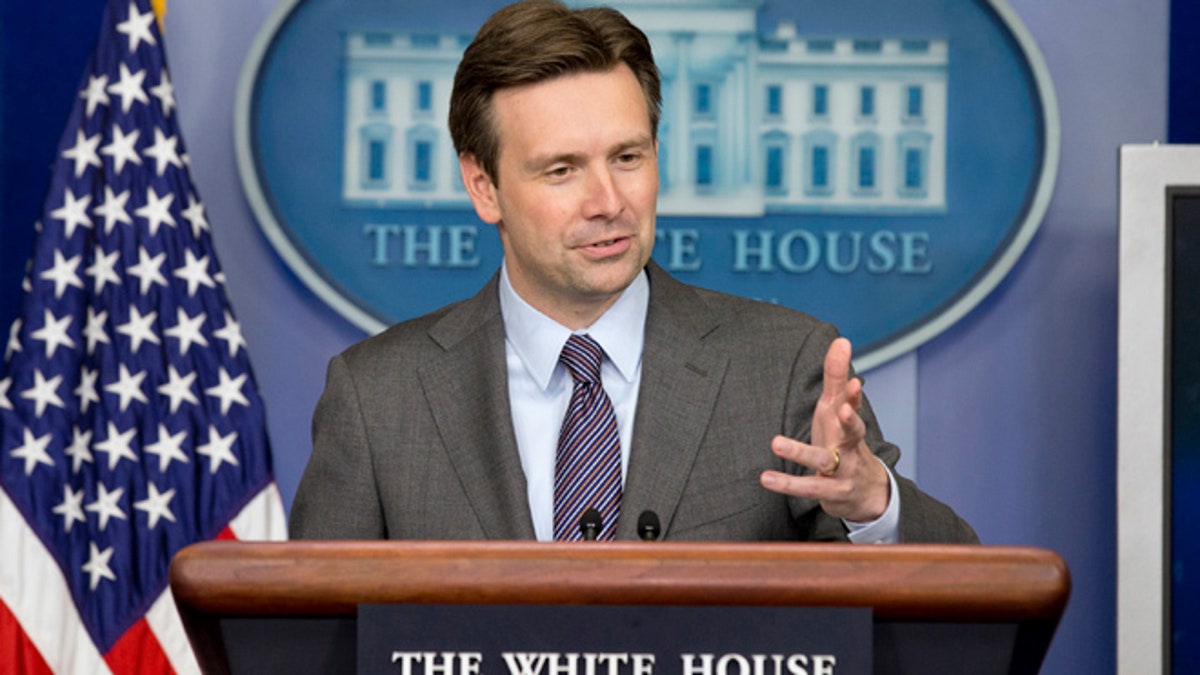
June 20, 2014: Incoming White House Deputy Press Secretary Josh Earnest in the Brady Press Briefing Room of the White House in Washington, D.C.
The White House press corps is giving incoming Press Secretary Josh Earnest high marks for dealing with reporters in a fair, level-headed manner during previous roles in the administration -- a solid opening position in a relationship that by nature is often intense and adversarial.
“Most of the press corps likes him,” says Steve Thomma, a senior White House reporter for McClatchy newspapers and president of the White House Correspondents Association. “There is a general sense of optimism. … But some of that will change, by nature.”
Thomma and others explained that Earnest, as deputy press secretary, was usually the first member of the White House communications team whom reporters would see every day and somebody who would answer basic questions and was considered “approachable.”
However, that relationship is expected to change when Earnest begins leading the daily White House press briefings in which TV reporters often spar with the press secretary to make news and create political theater for their audiences.
Thomma thinks reporters will understand -- almost hope -- to lose access to Earnest because he’ll need to be spending more time with President Obama and his other advisers if he’s to answer the more intricate questions about policy, initiatives and other issues.
Since Carney announced his resignation last month, reporters have pointed out some differences and possible similarities between him and Earnest.
They say the biggest difference is that Carney was a reporter for 21 years so he was already familiar with many in the press corps before joining the administration’s communication team roughly seven years ago, compared to Earnest who was less known and came from a pure political background. He joined the Obama campaign in Iowa in 2007.
They also say that Earnest will likely continue to help reporters gain more access to information and Obama, in part by taking questions from reporters throughout the briefing room -- not just from the TV correspondents in the front row.
Reporters say one of the biggest access issues is that the White House, in the era of social media, now holds meetings or events off limits to the press, then posts photos or videos on the WhiteHouse.gov site or on YouTube.
Thomma said some progress was made under Carney and he is optimistic that Earnest will continue.
“We have no problem with the White House sending out that stuff,” he said. “But we’d also like to be in the room.”
Still, reporters don’t expect much significant change, with Earnest considered as ardent of a supporter and defender as Carney of the president’s positions.
“You always get a little bit of a honeymoon coming out, and it lasts about 10 seconds,” Mike McCurry, a Clinton administration press secretary, recently told Politico.
The press corps and other observers have essentially been sympathetic lately toward Carney, who was known during his three years on the job to occasionally be combatative with reporters.
“He served about as much time as a press secretary as you can serve,” said Dana Perino, a Fox News political commentator and former Bush administration press secretary.
She recently deflected a question about whether reporters disliked Carney, instead saying her bigger concern was perhaps that the job had become too partisan.
“The press secretary’s job is not the spokesman for the DNC or RNC,” she said. “You are the press secretary for the entire country.”
Carney earlier this week acknowledged some regrets about tangling with reporters.
“If they’re really obnoxious and you get a little rattled and you engage, you finish the exchange thinking, ‘I won that,’ ” he told Steve Colbert, the host of Comedy Central’s “The Colbert Report.” “Then you look at it later on TV, and you realize that nobody actually sees the whole exchange. They just see you wagging your finger or looking like a jerk. And that’s not good for the president.”




